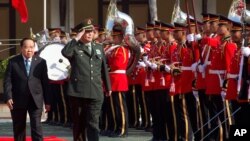Thailand’s bilateral relationship with China is advancing, evident by growing economic ties and military cooperation. Analysts, however, say Bangkok wants to set a more moderate course by rebalancing its foreign policy.
Earlier in December, Thai Deputy Prime Minister Prawit Wongsuwan led a delegation to China that included the Thai government’s key economic strategist, Somkid Jatusripitak. Several bilateral agreements covering trade, economic and investment cooperation were signed.
The plans include doubling two-way trade from $60 billion to $120 billion by 2020 as well as extending a five-year joint economic development plan.
Panitan Wattanayagorn, a political scientist and adviser to Deputy Prime Minister Prawit, said business and trade – as well as tourism – are driving the bilateral relationship.
“The relationship is expanding – that’s very clear and will continue in the next few years due to the necessity and proximity,” Panitan said.
During the talks, China accepted a Thai proposal to build a maintenance and production center for Chinese weapons in Thailand. Prawit also invited China to join Exercise Cobra Gold, a series of military exercises in Thailand that are led by the United States.
Other areas of increased military ties came with China and Thailand conducting joint exercises under what is known as the Blue Strike program that involves marines from both navies.
Prawit has led negotiations in the purchase of three Chinese-made Yuan class S26T submarines at a cost of $1 billion. Thailand has also bought battle tanks from China.
China’s minister of defense, Chang Wanquan, in an official statement, said Beijing was willing to strengthen cooperation in areas such as “joint training and national defense industry.”
Panitan said the armaments factory agreement highlights the growing bilateral relationship but that it was not marking a move away from close cooperation with the U.S.
“[The agreement] is a reflection of the close cooperation with the Chinese military and government in the security areas. [But] it doesn’t mean that we are replacing our traditional conventional cooperation with the U.S. We are also looking forward to working more with the incoming administration [of President-elect Donald Trump],” he said.
Analysts, however, note that Thailand's relationship with China has not been that smooth. They cite, for example, drawn out negotiations over a $5 billion high speed railway project in which Thailand will shoulder all the construction costs.
Thai authorities also clamped down on so-called ‘zero-dollar’ tourists from mainland China with the seizure of more than 2,000 tour buses and $130 million from Thailand’s largest China-geared tour operator. Analysts say the crackdown was aimed at stemming Chinese migration masked as low-end tourism.
Despite the growing relationship with China, Thailand is now setting a more moderate course by building closer ties with major powers such as Japan and India and reconnecting with the United States. Bilateral relations with Bangkok's longstanding ally were downgraded amid Washington's pressure on Thailand over that country's fishing industry and human rights issues.
Somphob Manarangsan, an economist and China analyst, said over the past year, Thailand has looked to broaden its international ties away from a focus on China.
“Currently, I think Thailand has tried to re-balance its cooperation not only with China, [but] also with Japan and also with the U.S.A. and some other countries,” said Somphob.
“In the last year, we can see the government try to keep some distance from China, even though the relationship is still going on as usual. They have a more multilayered diplomatic movement. It’s a good step but how good will depend on the capability of the government.”
Chulalongkorn University political scientist Thitinan Pongsudhirak said for Thailand – and Southeast Asia - the challenge lies in dealing with China’s growing regional influence.
“At the regional level we can see around here the rise of China and China’s assertiveness in the South China Sea is testing the U.S., testing the region,” said Thitinan.
“As a result not just Thailand, but the Philippines, Malaysia, Brunei, Cambodia, Laos – the regional states in Southeast Asia have had to accommodate Beijing,” he said. Thailand had moved close to China, “despite being a U.S. treaty ally.” China, he said, “is all over the place in the region in Southeast Asia.”
Thitinan also said Japan may be expected to take a larger role in the region’s security.
“We also have to look at Japan as the ‘New America’ in Southeast Asia. Japan is stepping up a bit. Maybe that might be enough to provide some counterbalance, but in the absence of the United States, I think China will still be way ahead,” he told VOA.
“We need a new balance in the region, with perhaps Japan out in front with the U.S. to check China’s runaway assertiveness,” he added.








